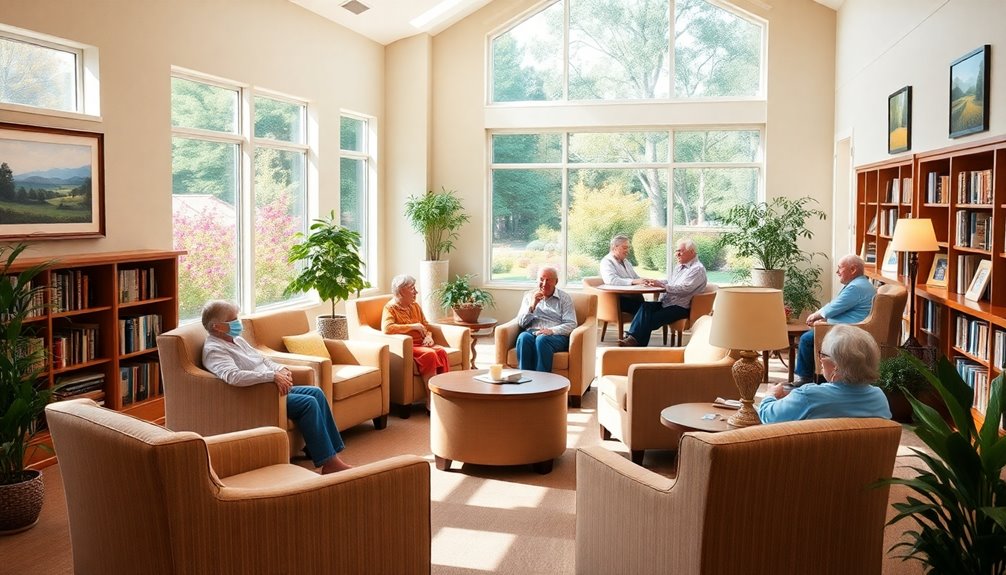To enhance mental health in senior living, start by educating yourself about mental health issues that affect seniors. Encourage open communication and seek professional support when needed. Be patient and understanding, while promoting social engagement through activities and connections. Support healthy lifestyle choices, manage medications effectively, and create a comfortable living environment. Don't forget to prioritize caregiver well-being, as your support is vital. Discover more ways to make a positive impact on seniors' mental health.
Key Takeaways
- Promote open communication by creating a safe environment where seniors feel comfortable sharing their feelings and experiences without judgment.
- Encourage social engagement through community events and regular activities, fostering connections that combat loneliness and enhance overall well-being.
- Establish healthy routines with structured daily activities, balanced nutrition, and regular physical exercise to improve mood and cognitive function.
- Educate seniors on coping strategies and treatment options to empower them in managing their mental health effectively.
- Create a comfortable living environment with familiar décor and adequate lighting, enhancing emotional well-being and reducing anxiety.
Education on Mental Health Issues

When you understand the specific mental health issues that often affect seniors, you can better support their well-being.
Seniors frequently face challenges like depression, anxiety, and cognitive decline, which impact their mental health. Nearly 20% experience depression but many don't seek help due to stigma or unawareness of mental health resources. Effective communication strategies can also help seniors express their feelings and seek the support they need. Additionally, being aware of filial responsibility laws can encourage families to provide the necessary support for seniors dealing with mental health issues.
Educating yourself about coping strategies and treatment options empowers both you and the seniors in your life to manage their mental well-being effectively. Legal protections for seniors experiencing mental health issues can ensure they receive the necessary support and resources.
Advocacy for seniors is vital, as it promotes awareness of mental health challenges and guarantees access to necessary services.
Encouraging Open Communication

Understanding mental health issues in seniors sets the stage for fostering open communication. Creating a safe environment for conversations greatly reduces feelings of isolation. When you encourage seniors to share their feelings without judgment, you validate their experiences, leading to improved mental health outcomes. Active listening shows empathy, allowing you to understand their needs better. Recognizing signs of stagnation in relationships can also help in addressing underlying emotional issues that may impact mental health. Incorporating mindfulness practices can further enhance self-awareness and emotional expression among seniors. Additionally, fostering a culture of experimentation and risk-taking allows seniors to engage in new activities that can boost their creativity and overall mental wellness.
| Benefits of Open Communication | Description |
|---|---|
| Emotional Connections | Deepens relationships |
| Support Systems | Provides necessary help |
| Sense of Belonging | Fosters community engagement |
Regular check-ins can help identify early signs of mental health challenges, enabling timely intervention. Ultimately, promoting open communication strengthens emotional connections, enhancing seniors' overall well-being.
Seeking Professional Support

While many seniors may hesitate to seek professional support for mental health issues, doing so can be an important step towards improved well-being.
Therapy or counseling can greatly alleviate symptoms of depression and anxiety, enhancing your quality of life. Group therapy sessions offer a shared experience, fostering community and reducing feelings of isolation while promoting emotional support. Engaging in nighttime meditation can also be a valuable tool for relaxation and mental clarity, further supporting emotional well-being. Additionally, practicing mindfulness through unplugging from technology can enhance your meditation experience and improve your connection with the present moment.
Early intervention is vital; it prevents mental health issues from escalating and helps develop better coping mechanisms. Regular check-ins with mental health professionals allow for monitoring of mood and cognitive function, ensuring timely treatment adjustments. Additionally, accessing community resources and support groups can enhance professional help, providing you with valuable strategies and connections for a healthier, happier life.
Moreover, it's essential to engage in physical activities which can manage stress levels and contribute to overall mental health improvements.
Practicing Patience and Understanding

Practicing compassionate communication can help you connect with them, making it easier for them to share their feelings. Additionally, being aware of the stages of grief can provide insight into their emotional responses, allowing for better emotional support during challenging times. Understanding patterns of emotional coldness can also promote deeper connections and improve overall well-being in senior living environments.
Mood Swings Awareness
Mood swings in seniors can be challenging, especially since they often arise from a mix of medication effects, chronic illnesses, or the emotional stresses tied to life changes.
As a caregiver, recognizing that these mood swings may be part of the aging process helps you maintain patience and provide the supportive environment seniors need. Active listening and validating their feelings during these fluctuations can foster emotional stability and reduce anxiety, ultimately enhancing their mental health.
Additionally, creating a calm, clutter-free space minimizes triggers for mood swings. Remember to monitor and document any significant changes, as this information can be essential for healthcare professionals to assess and adjust treatment plans effectively.
Your understanding can make a significant difference in their daily lives.
Compassionate Communication Techniques
Effective communication is essential in fostering positive relationships with seniors, especially during challenging times. By practicing compassionate communication, you create a safe space where seniors can express their emotions without fear of judgment.
Active and empathetic listening builds trust, encouraging them to share even when their words are unclear. Validating their feelings reinforces understanding and respect, which is crucial during mood swings or irritability. Additionally, establishing healthy boundaries can further enhance the effectiveness of your communication, ensuring mutual respect in interactions. Budgeting for seniors can also play a role in their overall mental well-being by reducing financial stress.
Maintaining a calm and supportive demeanor reduces resistance and opens the dialogue about mental health challenges. Remember, patience is key; when seniors struggle to articulate their thoughts, your compassionate approach shows that their experiences matter.
Ultimately, this supportive environment diminishes feelings of isolation, allowing seniors to feel valued and understood. Additionally, incorporating positive thinking strategies can further enhance their mental well-being and resilience.
Promoting Social Engagement

Engaging in community events and regular social activities is essential for your mental well-being. By participating, you not only combat feelings of loneliness but also boost your sense of belonging and purpose. These connections can lead to a happier, healthier life in your senior living community. Additionally, fostering emotional connections through shared experiences can significantly enhance your overall mental health. Building strong communication skills can also help establish deeper relationships and enhance relationships within your community.
Community Events Participation
When seniors participate in community events, they not only socialize but also combat feelings of loneliness and isolation, which are essential for maintaining mental health.
Engaging in these activities fosters social engagement, allowing you to form meaningful connections with others. This sense of belonging enhances your purpose within your living environment.
Research shows that regular social interaction considerably lowers the risk of depression and anxiety, contributing to your overall emotional well-being.
Organized activities like game nights or group outings stimulate cognitive function, encouraging positive interactions crucial for mental vitality.
Regular Social Activities
Participating in regular social activities can be a game changer for seniors, as it not only combats loneliness but also fosters a vibrant community spirit. Regular exercise and group activities enhance emotional well-being, leading to a happier, healthier life. By engaging in community-driven activities, you can build lasting connections and improve your mental health.
| Activity Type | Benefits | Examples |
|---|---|---|
| Group Activities | Sense of belonging | Game nights, art classes |
| Community Events | Shared experiences | Potlucks, music nights |
| Regular Exercise | Cognitive function improvement | Walking clubs, yoga sessions |
These interactions not only reduce depression rates but also contribute to a nurturing environment, ultimately enhancing your overall quality of life.
Establishing a Daily Routine

Establishing a daily routine can greatly enhance your overall well-being, as it provides the structure and predictability that many seniors find comforting.
By incorporating regular meal times, you can maintain nutritional balance, which is vital for your mental health.
Schedule enjoyable activities like hobbies or social gatherings to enhance emotional satisfaction and encourage social interaction, helping to combat feelings of loneliness.
Don't forget to include physical activity, such as walking or exercise classes, to improve your mood and cognitive function.
Finally, a consistent sleep routine is essential; it helps regulate your circadian rhythms, leading to better sleep quality.
Prioritizing these elements in your daily routine can considerably boost your mental health and overall quality of life.
Supporting Healthy Lifestyle Choices

Eating a balanced diet and staying active are key to your mental health as you age.
Incorporating more fruits, vegetables, and whole grains into your meals can boost your mood, while regular physical activity helps reduce anxiety and depression.
Balanced Diet Importance
A balanced diet plays an essential role in supporting mental health, especially for seniors. In a senior living community, prioritizing nutrients that support brain function is imperative. Incorporate plenty of fruits, vegetables, whole grains, and lean proteins to help produce neurotransmitters like dopamine and serotonin, essential for mood regulation.
Research shows that a Mediterranean diet can lower the risk of cognitive decline by 20%. Additionally, foods high in omega-3 fatty acids, like fish and walnuts, improve mood and reduce depression symptoms.
Don't forget gut health; a diet rich in fiber and probiotics can enhance mental well-being. By focusing on a balanced diet, you'll boost your energy levels and cognitive function, leading to a better overall quality of life.
Regular Physical Activity
Incorporating regular physical activity into your routine can considerably enhance your mental well-being as a senior. Engaging in activities not only helps improve cognitive function but also reduces symptoms of depression.
Here are three effective ways to get moving:
- Aerobic Exercise: Aim for at least 150 minutes of moderate aerobic exercise each week to boost your mood and promote the release of endorphins.
- Mindful Movement: Try yoga or tai chi, which can improve physical fitness while fostering emotional balance and reducing stress.
- Strength Training: Include strength exercises at least twice a week to enhance mobility and independence, contributing to a greater sense of purpose and self-worth.
Managing Medications Effectively

Managing medications effectively can considerably enhance the health and well-being of seniors. With many older adults taking multiple prescriptions, it's essential to stay organized. A healthcare professional can help you understand dosages and side effects, improving adherence and safety. Regular check-ins with them can keep you informed and engaged in your treatment plan.
Here are some strategies to help manage medications:
| Strategy | Description | Benefits |
|---|---|---|
| Pill Organizers | Use organizers to separate daily doses. | Reduces missed doses. |
| Daily Reminders | Set alarms or use apps for alerts. | Promotes routine adherence. |
| Family Support | Involve family members or caregivers. | Provides assistance and monitoring. |
| Education | Learn about your medications' importance. | Enhances understanding and safety. |
| Routine | Establish a consistent schedule. | Improves overall health outcomes. |
Creating a Comfortable Living Environment

Creating a comfortable living environment is essential for enhancing the well-being of seniors, as it can greatly impact their mood and mental health.
Here are three key elements to take into account:
- Familiar Décor: Use items and decorations that evoke positive memories to promote emotional well-being and reduce anxiety.
- Adequate Lighting: Make sure your living spaces are well-lit to create a bright atmosphere that enhances mood and combats depression.
- Access to Nature: Incorporate windows or outdoor spaces to provide access to nature, which can notably reduce stress and improve mental health.
Prioritizing Caregiver Well-being

A comfortable living environment for seniors sets the stage for effective caregiving, but it's just as important to focus on the well-being of caregivers themselves. Prioritizing self-care can greatly reduce caregiver burnout and enhance emotional well-being. Engaging in support groups fosters social connections, allowing caregivers to share experiences and coping strategies. Regular physical activity can alleviate stress, while maintaining hobbies boosts life satisfaction.
| Self-Care Activities | Emotional Well-Being | Support Systems |
|---|---|---|
| Regular breaks | Journaling | Caregiver support groups |
| Exercise routines | Mindfulness practices | Online forums |
| Hobbies or interests | Socializing | Community resources |
| Relaxation techniques | Counseling services | Family support |
| Healthy eating | Positive affirmations | Peer mentoring |
Frequently Asked Questions
How to Improve Elderly Mental Health?
To improve elderly mental health, focus on fostering social connections. Regular interaction can help combat loneliness.
Encourage participation in physical activities like walking or swimming to boost mood and cognitive function. Confirm a balanced diet rich in fruits and omega-3s to support brain health.
Establishing a consistent sleep routine is essential for emotional stability.
Finally, engage them in hobbies and creative activities to instill a sense of purpose and belonging.
What Are the 5 C's of Mental Health?
Imagine a garden blooming with vibrant flowers; that's what the 5 C's of mental health do for your emotional well-being.
First, you've got Connection, where social ties keep loneliness at bay.
Then there's Communication, encouraging you to voice your feelings without fear.
Coping equips you with tools to tackle stress, while Care reminds you to nurture yourself.
Finally, Community wraps you in a supportive network, creating a safe haven for growth and belonging.
What Are the Five 5 Popular Steps to Improve Your Mental Health?
To improve your mental health, start by staying connected with loved ones and engaging in social activities.
Prioritize physical activity; even a daily walk can boost your mood.
Embrace creativity through arts or music to express yourself and find fulfillment.
Nurture a healthy diet filled with fruits and vegetables to support brain health.
Finally, don't hesitate to seek professional help or join support groups for valuable resources and connections.
What Are the 7 Listed Ways to Maintain Positive Mental Health?
As the saying goes, "A friend in need is a friend indeed."
To maintain positive mental health, you should connect with others, get physically active, and eat healthy meals.
Prioritizing quality sleep helps regulate your mood, while practicing gratitude can boost your overall happiness.
Engaging in stimulating activities and seeking professional support when needed are also essential.
Conclusion
In your journey to enhance mental health in senior living, remember that every small step can lead to a brighter tomorrow. By fostering open communication and encouraging social connections, you're not just supporting others—you're planting seeds of hope and resilience. As you prioritize both residents' and caregivers' well-being, you create a warm, nurturing environment where everyone can thrive. Together, let's turn the page to a new chapter filled with joy, understanding, and lasting connections.









